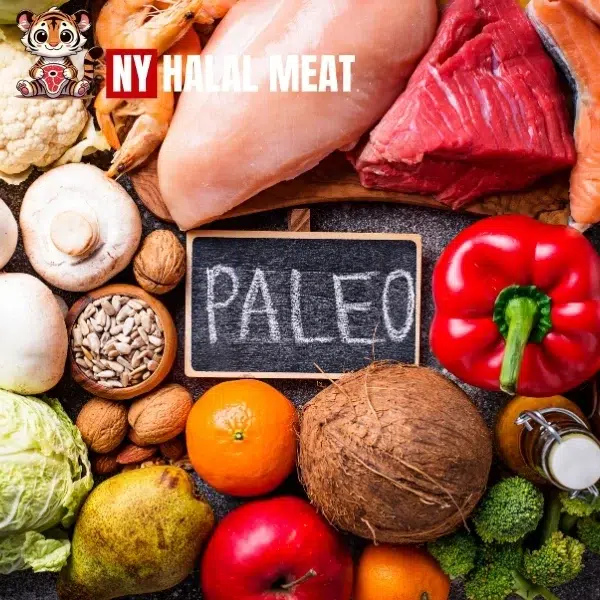Halal Options for People on a Paleo Diet
Understanding the Paleo and Halal Intersection
What Is the Paleo Diet?
The Paleo diet focuses on consuming foods that our hunter-gatherer ancestors might have eaten, such as:
- Proteins: Grass-fed meats, poultry, and seafood.
- Vegetables and Fruits: Seasonal and organic produce.
- Healthy Fats: Nuts, seeds, and oils like olive or coconut oil.
- Exclusions: Grains, legumes, dairy, and processed foods.
What Does Halal Mean?
Halal refers to foods permissible under Islamic law, derived from the Quran. The guidelines include:
- Meat must be slaughtered according to Islamic practices.
- No pork or alcohol is allowed.
- Ingredients must be free of haram (forbidden) substances, including certain additives.
Halal Paleo Protein Sources
Protein is a cornerstone of the Paleo diet. For halal followers, sourcing ethically slaughtered, halal-certified meat is crucial. Here are some options:
- Halal Grass-Fed Beef: Look for halal-certified butchers offering grass-fed beef, which aligns with Paleo principles by being free from grain-based feeds.
- Organic Free-Range Chicken: Opt for halal-certified poultry raised in natural conditions without antibiotics or hormones.
- Wild-Caught Seafood: Fish and other seafood are naturally halal and Paleo-friendly. Focus on wild-caught varieties to avoid contaminants and support sustainability.
- Lamb and Goat: These meats are common in halal cuisine and can easily fit into Paleo recipes, such as stews or grilled dishes.
Vegetables and Fruits: The Foundation of Paleo
Vegetables and fruits play a significant role in the Paleo diet, providing essential vitamins and minerals. Halal-certified produce doesn’t require special labeling, but organic options are preferable for avoiding pesticides. Consider these staples:
- Leafy greens: Kale, spinach, and arugula.
- Cruciferous vegetables: Broccoli, cauliflower, and Brussels sprouts.
- Low-sugar fruits: Berries, citrus, and avocados.
Halal-Friendly Paleo Fats
Healthy fats are essential for energy and overall health. Some great halal and Paleo-compatible options include:
- Olive Oil: Ideal for cooking and dressings.
- Coconut Oil: Perfect for baking and sautéing.
- Nuts and Seeds: Almonds, walnuts, and flaxseeds (ensure no cross-contamination with non-halal items).
Spices and Seasonings
Flavor is a vital part of both Paleo and halal cooking. Avoid pre-mixed seasonings that might contain non-halal additives. Stick to whole spices like:
- Turmeric
- Cumin
- Paprika
- Black pepper
- Garlic powder
Halal Paleo Snacks
Finding snacks that meet both Paleo and halal criteria can be tricky, but these ideas can keep you satisfied:
- Beef Jerky: Homemade using halal-certified grass-fed beef.
- Vegetable Chips: Baked kale or sweet potato chips.
- Nut Mixes: A blend of raw almonds, walnuts, and dried fruit (unsweetened).
Meal Prep and Dining Out Tips
Home Cooking
Meal prep ensures full control over ingredients, making it easier to adhere to both Paleo and halal principles. Invest in high-quality halal meat, fresh vegetables, and essential oils.
Dining Out
Research halal-certified Paleo-friendly restaurants or request custom dishes, such as grilled proteins with a side of vegetables.
Recipes to Get Started

- Grilled Halal Chicken with Avocado Salad:Ingredients: Halal chicken breasts, olive oil, lemon juice, mixed greens, avocado, and cherry tomatoes.
Directions: Marinate chicken in olive oil and lemon juice, then grill. Serve with a fresh avocado salad.
- Lamb and Vegetable Stew:Ingredients: Halal lamb, carrots, celery, onions, garlic, and broth.
Directions: Simmer lamb and vegetables in a slow cooker for a hearty meal.
- Coconut Flour Pancakes:Ingredients: Coconut flour, eggs, coconut milk, and a pinch of cinnamon.
Directions: Mix ingredients and cook on a non-stick pan for a Paleo-friendly breakfast.
Conclusion
Living a halal and Paleo lifestyle is not only possible but also rewarding. By focusing on whole, unprocessed foods and sourcing halal-certified ingredients, you can enjoy the health benefits of the Paleo diet while adhering to your faith. With a bit of planning and creativity, you can craft a sustainable and delicious way of eating that aligns with both principles.


